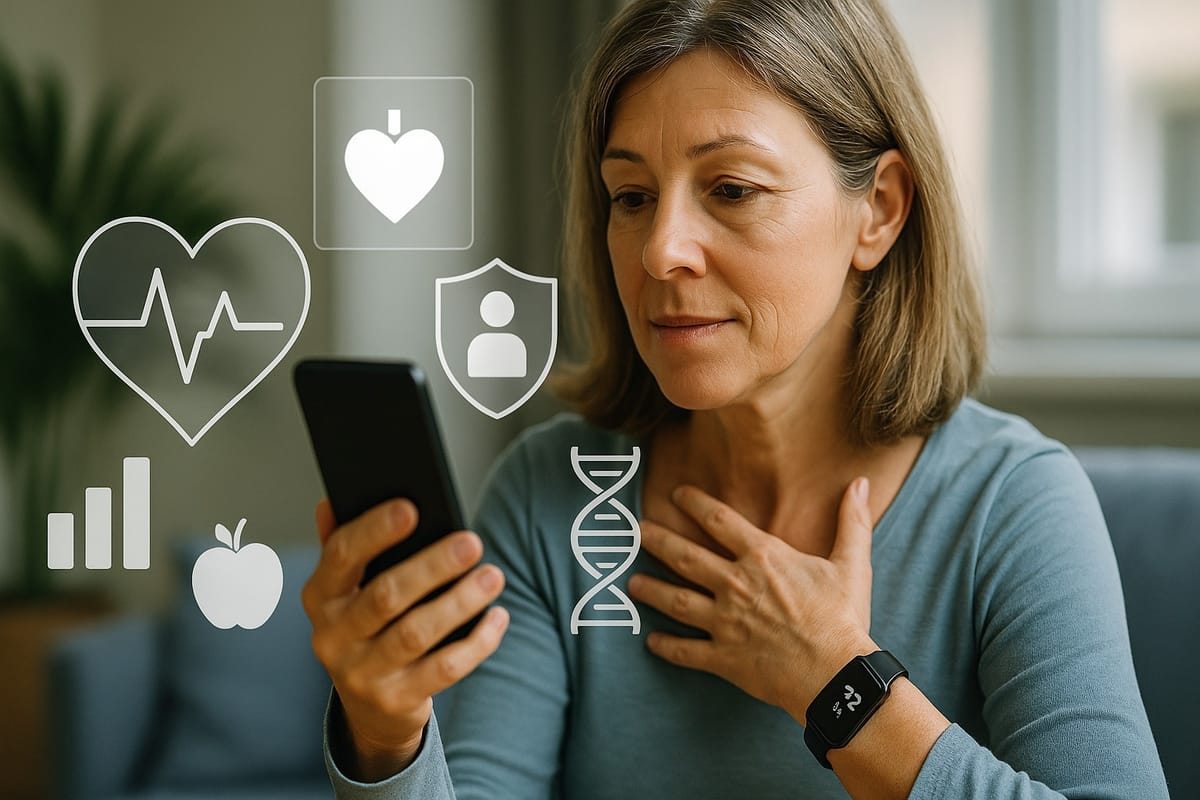Part 6 of 7 – AI in Healthcare: Preventive Care and Wellness Tracking

Preventive care represents the cornerstone of practical medicine, offering a path that reduces human suffering while simultaneously lowering healthcare costs and improving quality of life. This approach has gained renewed significance with the convergence of artificial intelligence and the widespread adoption of data collection capabilities. We are witnessing a healthcare revolution where maintaining wellness becomes an active, personalized, and continuous process rather than a series of reactive responses to illness.
The traditional model of healthcare has operated much like a fire department, responding to emergencies after they occur. Patients typically engage with the healthcare system only when symptoms become noticeable or concerning, often after the condition has progressed significantly. This reactive approach, although necessary for acute care, overlooks numerous opportunities for intervention during the early stages when treatments are most effective and least invasive.
Artificial intelligence is transforming the way we approach preventive care through sophisticated wellness tracking systems, advanced risk detection algorithms, and highly personalized lifestyle recommendations. These technologies represent a significant departure from the one-size-fits-all approaches of the past, offering instead a nuanced understanding of individual health patterns and needs.
Modern wearable devices exemplify this transformation. These small, unobtrusive sensors continuously monitor dozens of health metrics including heart rate variability, sleep architecture, activity levels, and even stress indicators through skin conductance measurements. What makes these devices revolutionary is not just their ability to collect data, but how AI algorithms interpret this information to create meaningful health insights.
Beyond wearables, smartphone applications have become powerful tools for tracking dietary habits, mood patterns, medication adherence, and lifestyle factors. These apps can photograph meals to analyze nutritional content, track movement patterns to assess activity levels, and even analyze voice patterns for early signs of cognitive changes or mood disorders. The integration of these multiple data streams creates a more complete picture of an individual's health status that was previously impossible to achieve.
Perhaps the most promising aspect of AI-powered preventive care lies in its ability to detect subtle changes in health metrics long before traditional symptoms manifest. These systems excel at identifying patterns within vast amounts of data that would be impossible for human observers to recognize. A gradual increase in resting heart rate, combined with changes in sleep quality and activity levels, may signal the early stages of cardiovascular stress months before a patient experiences symptoms such as chest pain or shortness of breath.
Similarly, AI algorithms can analyze patterns in blood glucose fluctuations, weight changes, and activity levels to identify individuals at risk for developing diabetes, often years before a clinical diagnosis. For mental health conditions, these systems can detect changes in communication patterns, social interaction frequency, sleep disturbances, and activity levels that may indicate the emergence of depression or anxiety disorders.
The sophistication of these detection systems continues to evolve. Machine learning algorithms can now identify biomarkers in routine blood tests that suggest an increased risk of cancer, analyze retinal photographs to predict cardiovascular disease, and assess gait patterns captured by smartphone accelerometers to detect early signs of neurological conditions, such as Parkinson's disease.
The true power of AI in preventive care extends beyond detection to the development of personalized intervention strategies. It empowers individuals to take control of their health by analyzing their lifestyle, preferences, medical history, and even genetic predispositions to suggest highly targeted interventions that are both effective and sustainable.
Consider how an AI wellness platform might approach stress management for individuals with varying needs. For a busy executive who travels frequently, the system might recommend brief meditation exercises that can be completed in airport lounges, stress-reduction techniques that work within a packed schedule, and sleep optimization strategies for different time zones. For a stay-at-home parent managing young children, the same system might suggest different approaches that accommodate unpredictable schedules and limited time alone.
These personalized recommendations encompass nutrition, exercise, sleep optimization, and medication management. AI systems can analyze how an individual responds to different types of physical activity, identify which dietary changes yield the most significant health improvements, and determine which behavior modification techniques are most likely to result in lasting change. This level of personalization significantly enhances the likelihood that individuals will adopt and sustain healthy behaviors.
AI-powered preventive care tools are also revolutionizing how healthcare providers interact with their patients. Rather than waiting for annual check-ups or emergency visits, providers can now maintain continuous awareness of their patients' health status through AI-generated reports and risk assessments. This doesn't replace the personal touch of a healthcare provider but rather enhances their ability to provide personalized care.
These systems can prioritize patient outreach based on sophisticated risk models, ensuring that healthcare providers focus their attention where it's most needed. When a patient's AI health profile indicates concerning trends, providers receive alerts that enable them to intervene proactively. This may involve scheduling an earlier appointment, adjusting medications, or providing targeted health coaching to prevent problems from escalating.
Technology also enhances medication adherence through intelligent reminder systems that teach individual patterns and preferences. Rather than generic daily reminders, these systems can identify optimal timing based on a person's routine, recognize when medications are consistently missed, and suggest practical solutions to improve compliance.
One of the most significant opportunities presented by AI-powered wellness tracking lies in its potential to bridge longstanding healthcare disparities. Traditional preventive care often requires regular visits to healthcare facilities, comprehensive insurance coverage, and taking time off work for medical appointments. These barriers disproportionately affect rural populations, low-income communities, and other underserved groups. AI-powered wellness tracking platforms can deliver sophisticated preventive care services through low-cost sensors and cloud-based systems accessible via smartphone or basic internet connections, offering hope for a more equitable healthcare future.
AI-powered wellness tracking platforms can deliver sophisticated preventive care services through low-cost sensors and cloud-based systems, accessible via smartphones or basic internet connections. These platforms can provide health monitoring, risk assessment, and personalized recommendations to individuals who might otherwise have limited access to preventive care services. This can help bridge the gap in healthcare disparities and ensure that everyone has access to quality healthcare.
Community health programs can leverage these technologies to expand their reach and enhance effectiveness. AI systems can help identify high-risk individuals within communities, coordinate care resources more efficiently, and provide culturally sensitive health recommendations that take into account local conditions and preferences.
The expansion of AI-powered preventive care brings significant ethical responsibilities that must be carefully addressed. Data privacy represents perhaps the most critical concern, as these systems collect intimate details about individuals' daily lives, health status, and personal behaviors. People must have clear and comprehensible information about how their health data is collected, stored, analyzed, and shared to ensure their security and peace of mind.
Algorithmic fairness presents another crucial challenge. AI systems trained on data that doesn't adequately represent diverse populations may produce recommendations that work well for some groups while being less effective or even harmful for others. Ensuring that these systems work equitably across different demographics, socioeconomic backgrounds, and health conditions requires ongoing vigilance and diverse input in the design and testing of these systems.
Informed consent is complex in the context of continuous monitoring and AI analysis. Traditional medical consent processes are designed for discrete interventions. Still, AI wellness tracking involves ongoing data collection and analysis that may reveal unexpected information or identify risks that users didn't anticipate. Developing consent processes that truly inform users while remaining practical and understandable presents significant challenges.
The integration of AI into preventive care represents more than technological advancement; it embodies a fundamental shift in healthcare philosophy. Rather than focusing primarily on treating disease after it occurs, we're moving toward a model that emphasizes maintaining wellness, preventing illness, and optimizing quality of life throughout the lifespan.
This transformation promises healthcare that is more personalized, accessible, and effective than ever before. Individuals gain unprecedented insight into their health patterns and receive customized guidance tailored to their unique circumstances and goals. Healthcare providers can offer more targeted, timely interventions while managing larger patient populations more effectively.
The ultimate vision extends beyond preventing specific diseases to optimizing human potential. AI-powered wellness tracking could help individuals identify their optimal sleep schedules, discover which types of physical activity they find most enjoyable and sustainable, and develop eating patterns that enhance both physical health and cognitive performance.
The focus must remain on serving human flourishing rather than technological capability for its own sake. The goal is not simply to collect more data or deploy more sophisticated algorithms, but to help people live healthier, more fulfilling lives with greater autonomy over their wellbeing.
Success in this endeavor will require collaboration between technologists, healthcare providers, ethicists, and communities to ensure that AI-powered preventive care truly serves the diverse needs of all people. When implemented thoughtfully and responsibly, these technologies offer the potential to create a healthcare system that not only treats illness but actively promotes human thriving.
BearNetAI, LLC | © 2024, 2025 All Rights Reserved
Support BearNetAI
BearNetAI exists to make AI understandable and accessible. Aside from occasional book sales, I receive no other income from this work. I’ve chosen to keep BearNetAI ad-free so we can stay independent and focused on providing thoughtful, unbiased content.
Your support helps cover website costs, content creation, and outreach. If you can’t donate right now, that’s okay. Sharing this post with your network is just as helpful.
Thank you for being part of the BearNetAI community.
Books by the Author:

Categories: AI in Healthcare, Preventive Medicine, Digital Health & Wearables, Ethics and Privacy in AI, Health Equity
Glossary of AI Terms Used in this Post
Algorithmic Fairness: The principle of ensuring AI systems provide equitable outcomes across diverse populations, avoiding bias against specific groups.
Biomarkers: Biological indicators measured by AI systems to detect or predict health conditions, such as glucose levels or retinal images.
Continuous Monitoring: The use of AI and sensors to track health data in real time without interruption, providing a dynamic picture of wellness.
Data Privacy: The protection of personal health information collected by AI systems, ensuring it is stored, analyzed, and shared securely.
Informed Consent: The process of educating users about how their data is collected and analyzed by AI systems, enabling them to make knowledgeable decisions about participation.
Machine Learning: A subset of AI that uses algorithms to detect patterns and make predictions from large amounts of health-related data.
Personalized Intervention: AI-driven strategies tailored to an individual’s lifestyle, genetics, and health data for preventive care and wellness.
Predictive Analytics: The use of AI algorithms to forecast future health risks by identifying patterns in existing data.
Wearable Devices: Portable sensors that collect health metrics such as heart rate, sleep quality, and activity levels, often integrated with AI for insights.
Wellness Tracking: AI-enabled monitoring of lifestyle and health behaviors to optimize well-being and prevent disease progression.
Citations:
Esteva, A., Robicquet, A., Ramsundar, B., Kuleshov, V., DePristo, M., Chou, K., … & Dean, J. (2019). A guide to deep learning in healthcare. Nature Medicine, 25(1), 24–29.
iang, F., Jiang, Y., Zhi, H., Dong, Y., Li, H., Ma, S., … & Wang, Y. (2017). Artificial intelligence in healthcare: past, present and future. Stroke and Vascular Neurology, 2(4), 230–243.
Obermeyer, Z., & Topol, E. (2019). Artificial intelligence in healthcare: fair, equitable, and inclusive? The Lancet Digital Health, 1(8), e379–e380.
Topol, E. J. (2019). High-performance medicine: the convergence of human and artificial intelligence. Nature Medicine, 25(1), 44–56.
Wahl, B., Cossy-Gantner, A., Germann, S., & Schwalbe, N. R. (2018). Artificial intelligence (AI) and global health: how can AI contribute to health in resource-poor settings? BMJ Global Health, 3(4), e000798.
This post is also available as a podcast:
LinkedIn BlueskySignal: bearnetai.28